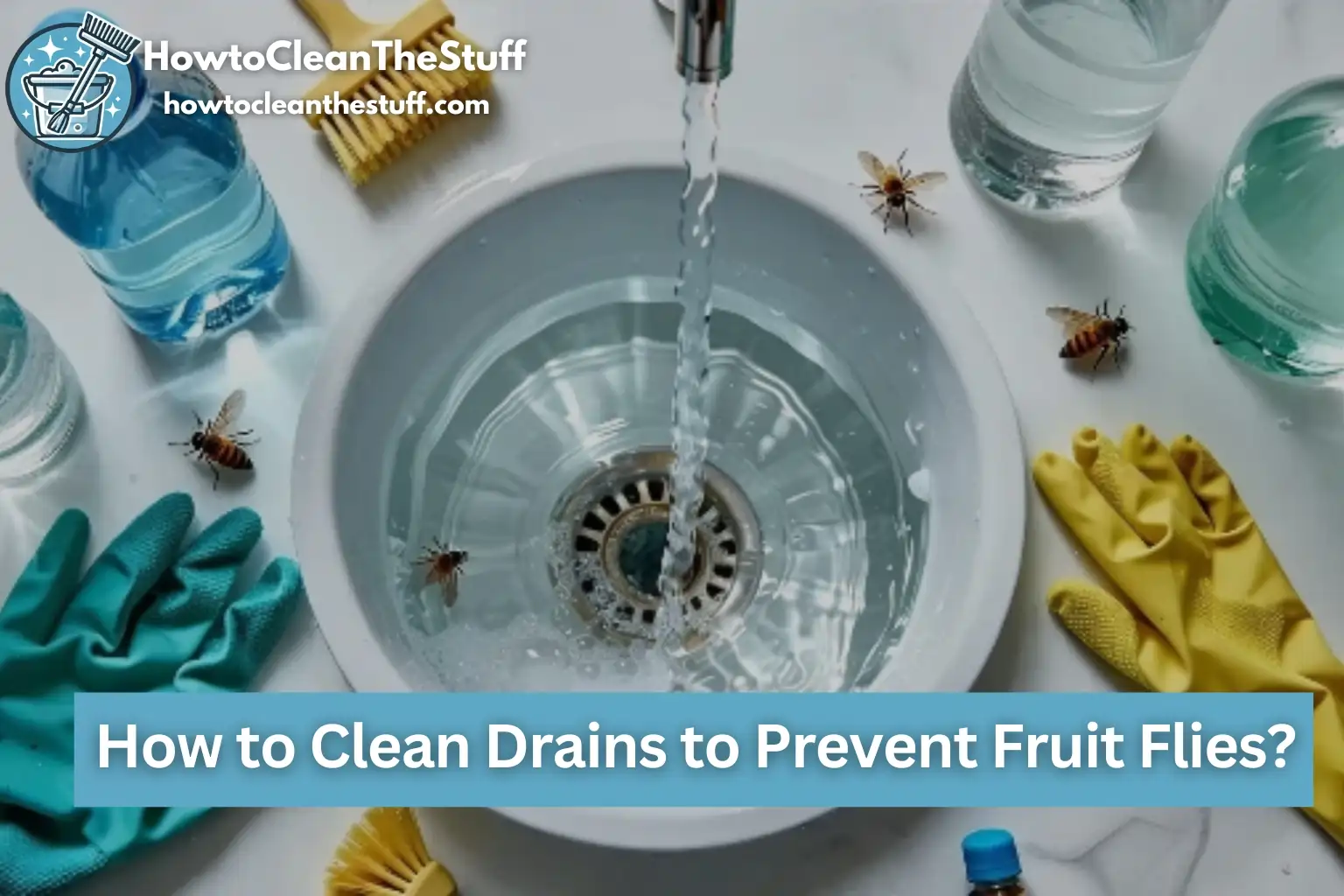How to Clean Drains to Prevent Fruit Flies: 6 Effective Steps for Long-Lasting Results
Ever wonder where those tiny, annoying flies in your kitchen come from? Chances are, they’re living in your drain! These small bugs love damp, dark spaces where old food and moisture collect. If you’re tired of swatting away fruit flies, this guide will show you how to kick them out for good.
Learn how to clean drains to prevent fruit flies and keep these pesky insects away – no special skills required. Ready to say goodbye to fruit flies? Let’s get started and reclaim your kitchen!
Why Fruit Flies Love Drains
Fruit flies are drawn to drains because they offer the perfect conditions for survival and reproduction:
- Moisture: Drains often have standing water, which is essential for fruit flies. The damp environment helps them live and breed.
- Food Sources: Food scraps, grease, and organic residue build up in drains, providing fruit flies with a steady food supply. Even tiny amounts of leftover food can attract them.
- Safe Breeding Spot: The dark, enclosed space of a drain protects fruit fly eggs from the outside environment, keeping them safe from disturbances.
These factors make drains ideal spots for fruit flies to infest. If not cleaned, these areas become breeding grounds, leading to unpleasant odors and potential hygiene issues in your home. Properly cleaning your drains helps remove the conditions that attract these pests.
Identifying Fruit Flies in Your Drains
To spot a fruit fly infestation in your drains, look for these clear signs:
- Presence of Flies: If you see small, brownish flies buzzing around your sinks or garbage disposals, it’s a strong indication of an issue. Fruit flies are drawn to areas where food and moisture collect, such as drains. They usually appear in large numbers near the sink or other wet spots in your kitchen or bathroom.
- Unpleasant Odors: A bad smell coming from your drains often means there’s decaying food, grease, or other organic matter inside. Fruit flies feed on these materials, and the smell is a sign that they’ve been there for a while. If you notice a sour or rotting smell near your sink, it’s time to check your drains.
By catching these signs early, you can act quickly to clean the drains before the problem gets worse. The longer you wait, the more difficult it will be to control the fruit fly population. Regular inspections of your kitchen and bathroom areas can help you keep them at bay.
6 Fast and Effective Steps on How to Clean Drains to Prevent Fruit Flies
Keep your drains clean to prevent fruit flies and keep your home fresh and hygienic. Dirty and damp drains are the perfect place for these pests to grow, but with regular cleaning, you can stop them.
Before starting, check out the video below. It explains simple steps and helpful tips to make the process easy for anyone.
Once you’ve watched, follow the steps below to clean your drains effectively!
Step 1: Gather Your Supplies
Before you begin, make sure you have everything you need:
- Rubber gloves: Protect your hands from dirt and bacteria that may be in the drain.
- Baking soda and vinegar: These common household items help break down grease and residue naturally.
- Boiling water: This helps flush away loosened debris and cleans the pipes thoroughly.
- Pipe brush or drain snake: These tools help you scrub away tough buildup inside the drain.
- Optional: Eco-friendly drain cleaner: For added cleaning power, you can use a safe, biodegradable cleaner that won’t harm your plumbing.
Having all your supplies ready makes the cleaning process smoother and faster, saving you time in the long run.
Step 2: Remove Visible Debris
Start by wearing your gloves. Use a pipe brush or your hands to clear out any visible debris in the drain. This may include food scraps, hair, or grease that could clog the pipe. Removing debris ensures you’re not just covering up the problem and that the drain is ready for deeper cleaning.
Clearing out visible debris also prevents it from blocking water flow, which could lead to bigger issues later.
Step 3: Use Baking Soda and Vinegar
- Pour ½ cup of baking soda into the drain.
- Follow with ½ cup of vinegar. This mixture will fizz and bubble, helping to break down any grease or organic buildup in the pipes.
- Let the mixture sit for 30 minutes. During this time, the bubbling action loosens dirt, residue, and debris from the sides of the drain.
- After 30 minutes, flush with boiling water. This will wash away the loosened grime, leaving the drain clean.
This step is simple and effective, using natural ingredients to clear away everyday residue and keep your drain fresh.
Step 4: Deep Clean the Drain
For tough clogs or stubborn buildup, use a drain snake or pipe brush to scrub the inside of the pipes. Push the snake into the drain and gently twist it to break up anything stuck along the pipe walls. After scrubbing, flush the drain with boiling water again to ensure all debris is washed away.
This step helps ensure that your drain is completely clear, preventing future clogs and odors.
Step 5: Disinfect the Drain
To disinfect the drain and eliminate lingering odors, mix vinegar and water in a 1:1 ratio. Pour this mixture down the drain to kill any bacteria and neutralize any smells. Disinfecting your drain also reduces the chance of attracting pests, including fruit flies, who thrive in dirty, bacteria-filled environments.
This final cleaning step ensures your drain stays fresh and hygienic, improving the overall cleanliness of your home.
Step 6: Test the Drain
Once you’ve completed the cleaning, run some water through the drain to check that it flows smoothly. If the water drains quickly and without any trouble, your cleaning was successful. However, if you notice slow drainage or standing water, you may need to repeat the process or try using a drain snake again.
Testing the flow helps confirm that your drain is completely cleared and ready to use without any blockages.
By following these steps regularly, your drains will stay clean and free from fruit flies and other pests. Proper maintenance is key to avoiding bigger plumbing issues down the road while keeping your home fresh and healthy.
Preventive Measures to Keep Fruit Flies Away
To avoid future fruit fly infestations, there are a few simple and effective actions you can take. By staying consistent with these habits, you can keep your home fresh and free of pests.
- Regular Cleaning: Flushing your drains with boiling water once a week is a quick and easy way to prevent debris from building up. Boiling water helps dissolve any remaining grease and food particles that attract fruit flies. Consistency is key to keeping your drains clean and ensuring they don’t become breeding grounds for pests.
- Use Strainers: Sink strainers are small, simple tools that catch food scraps and debris before they enter your drain. By using strainers, you prevent food from accumulating inside the pipes, which is what attracts fruit flies. These are easy to clean and make a big difference in reducing the buildup of waste in your plumbing.
- Proper Disposal of Grease and Food Waste: Avoid pouring grease or food waste down the drain. Grease can harden in pipes, causing blockages, while food scraps provide a steady food source for fruit flies. Instead, dispose of food scraps in the trash or compost, keeping your plumbing and home free of attractants for pests.
- Keep Sinks Dry: After using the sink, wipe down sink areas to remove excess moisture. Fruit flies thrive in damp conditions, so drying up any wet areas around the sink can help keep them from breeding. Keeping your kitchen dry and clean is one of the most effective ways to discourage pests from returning.
These simple preventive measures will help ensure that your drains stay clean, your kitchen stays fresh, and your home remains free from fruit flies. Make them a regular part of your routine to keep pests away for good.
When to Call a Professional
In some cases, despite your best DIY efforts, the fruit fly issue or drain problems may persist. Here are times when it’s a good idea to get a professional involved:
a) DIY Methods Aren’t Working:
If you’ve tried cleaning the drains multiple times and fruit flies keep returning, or the drain still gets clogged, it might be a sign that there’s a bigger problem. A professional plumber can check for deeper issues and provide more thorough solutions.
B) Ongoing Clogs or Fruit Fly Problems:
If clogs keep coming back or the fruit fly issue doesn’t go away after cleaning, there may be a hidden blockage or buildup in the pipes that need special tools or techniques to remove. Professionals have the equipment to tackle these issues and ensure they don’t come back.
c) Plumbing Issues:
If you think there may be damage to your pipes, like a cracked p-trap or a leak, it’s best to call a plumber. These problems can cause water to leak or create breeding grounds for fruit flies. A plumber can find and fix the issue, stopping it from affecting your drains or attracting pests.
If you’ve tried everything and the problem persists, don’t hesitate to call in the experts. They can fix issues that may be hard to spot on your own and help eliminate any long-term plumbing or pest problems.
Conclusion:
In conclusion, yes – getting rid of fruit flies in your kitchen drains is easy! With a few simple steps using things you already have at home, like baking soda and vinegar, you can stop these tiny bugs from taking over. Just clean your drains regularly, keep them dry, and watch out for food scraps.
Don’t let fruit flies ruin your kitchen! Grab your cleaning supplies and take back control today – your pest-free home starts right now! 🚰✨







